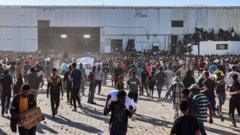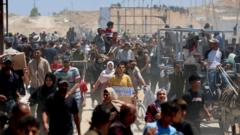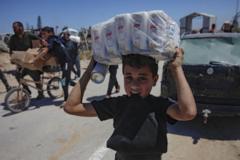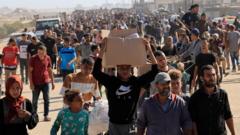A break-in at a food supply warehouse in central Gaza highlights the escalating humanitarian crisis, as desperate crowds seek dwindling resources amid ongoing conflict.
Gaza Faces Humanitarian Crisis as Warehouse Break-In Sparks Violence

Gaza Faces Humanitarian Crisis as Warehouse Break-In Sparks Violence
UN's World Food Programme reports looting of food supplies amid severe hunger in Gaza.
The World Food Programme (WFP) has reported a troubling incident in which "hordes of hungry people" broke into a warehouse in Deir Al-Balah, Gaza. The alarmingly chaotic scene, marked by shouts and tumult, resulted in the deaths of at least two individuals and multiple injuries. This event underscores the severe food shortages exacerbated by an Israeli blockade lasting nearly three months, which was slightly alleviated last week.
Footage captured during the incident shows thousands of people rummaging through the Al-Ghafari warehouse, seizing bags of flour and other food items, all while gunfire erupted in the vicinity. The origins and motives behind the gunfire remain unclear. In response to the dire situation, the WFP expressed that humanitarian needs in Gaza have dramatically escalated, stressing that food assistance must be immediately scaled up to prevent starvation among the population.
As the situation worsened, WFP representatives reiterated their warnings about the deteriorating conditions faced by Gazans, citing "alarming" levels of need. Reports indicate that 121 aid trucks, comprising food supplies and other essentials, were allowed into Gaza just recently. However, UN Middle East envoy Sigrid Kaag characterized this level of aid as insufficient, likening it to a "lifeboat after the ship has sunk," given the looming threat of famine in the territory.
The establishment of an alternative private aid distribution system by the Gaza Humanitarian Foundation (GHF), backed by the US and Israeli governments, has stirred controversy. The GHF claims to prevent aid from being pilfered by Hamas, which the armed group vehemently denies. Large crowds of hungry individuals have reportedly flocked to GHF distribution centers amid fears of food insecurity. However, a UN Human Rights Office report indicated that this alternative system has led to violent overcapacity, with dozens sustaining injuries as people overwhelmed a GHF center in Rafah shortly after operations commenced.
Commentary from Jonathan Whittall, head of the UN's humanitarian office for occupied territories, suggests the problem of theft is not attributable to Hamas, but rather criminal gangs situated near conflict areas. He reiterated the need for a significant upsurge in aid, akin to the efforts made during recent ceasefires, which could potentially alleviate both hunger and looting incidents.
Israeli representatives have criticized UN procedures as "mafia-like," suggesting that the organization is threatening entities like the GHF and is undermining efforts to manage aid distribution effectively. Meanwhile, the UN maintains that the current aid distribution system employed by Israel fosters scarcity, only providing resources to southern Gaza while the majority of the population resides in the north.
As the situation in Gaza remains critical, calls for increased humanitarian aid and effective distribution measures are more pressing than ever, amidst fears of worsening conditions in the conflict-stricken region.




















